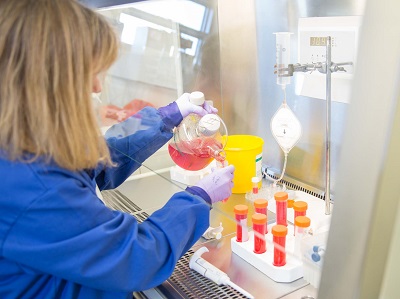A new frontier for red cells
How new ways to collect red cells and even create them in the lab could help patients.
How new ways to collect red cells and even create them in the lab could help patients.
 We have around 20-30 trillion red cells in our blood at any one time, and every second they are busy taking oxygen to tissues and removing carbon dioxide. They are lifesavers. So anything that makes it easier to collect them and get them to the right patient at the right time is a priority for us.
We have around 20-30 trillion red cells in our blood at any one time, and every second they are busy taking oxygen to tissues and removing carbon dioxide. They are lifesavers. So anything that makes it easier to collect them and get them to the right patient at the right time is a priority for us.
Double dose donation
So we are looking at a new way of collecting red cells. We are asking some donors with in-demand blood groups, such as O-neg, B-neg and Ro (an Rh sub-type) to give a double dose of red cells with each donation. To take the cells, we use a special machine called a cell separator – much in the same way that we extract platelets. This machine takes the blood and separates out the red cells before the rest of the blood components are returned to the donor.
Trials are running in Tooting and Birmingham donor centres. Potential double dose volunteers are assessed at their session. They must weigh more than 70kg and have a haemoglobin level of 140g/l or more. Donors who give double doses will only be invited to give blood twice a year. If the trials are successful, we will roll out the process to every donor centre with a cell separator machine.
Culturing red cells
Patients with rare blood group types could be set to benefit from our research into culturing red blood cells in the lab. NHSBT scientists, based at Filton and the University of Bristol, have developed a process that uses stem cells that are normally discarded during routine processing of blood donations. These cells are cultured in a cocktail of nutrients and growth factors over three weeks to produce tens of billions of fresh reticulocytes – the precursors to red blood cells.
Whilst we will continue to rely on blood from our donors, this lab-grown product has the potential to provide better treatment for patients who need regular transfusions throughout their life (such as those with thalassaemia and sickle cell disease). With this product, patients could need fewer transfusions. This is important because the iron in red cells can build up in tissues, ultimately causing organ damage.
A trial using the cultured cells will start within the next 12 months and eligible participants will be invited from the Cambridge area. Find details on the trial page at www.bristol.ac.uk/btru/.
In this issue of The Donor magazine
Helping young people get the message
Save someone's life while going about yours
Have you had the conversation?
